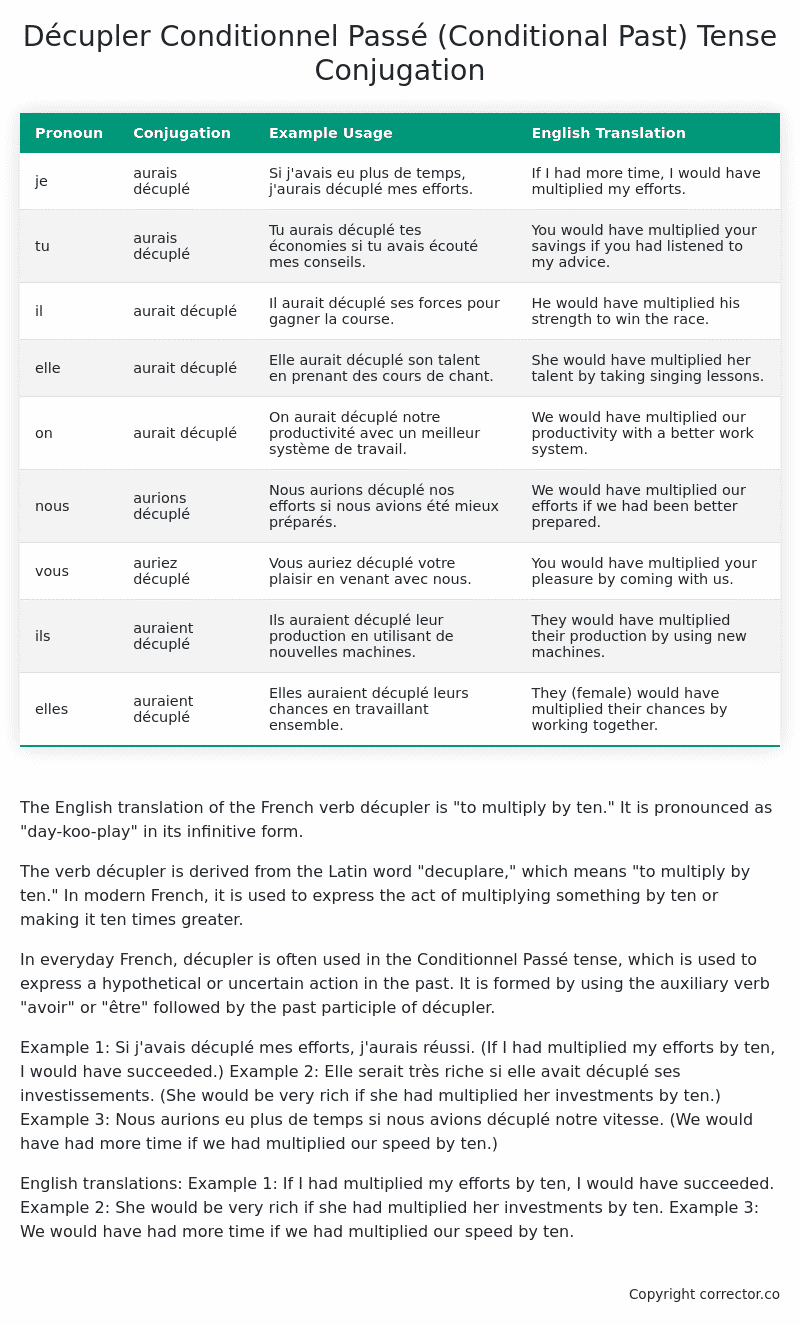Conditionnel Passé (Conditional Past) Tense Conjugation of the French Verb décupler
Introduction to the verb décupler
The English translation of the French verb décupler is “to multiply by ten.” It is pronounced as “day-koo-play” in its infinitive form.
The verb décupler is derived from the Latin word “decuplare,” which means “to multiply by ten.” In modern French, it is used to express the act of multiplying something by ten or making it ten times greater.
In everyday French, décupler is often used in the Conditionnel Passé tense, which is used to express a hypothetical or uncertain action in the past. It is formed by using the auxiliary verb “avoir” or “être” followed by the past participle of décupler.
Example 1: Si j’avais décuplé mes efforts, j’aurais réussi. (If I had multiplied my efforts by ten, I would have succeeded.)
Example 2: Elle serait très riche si elle avait décuplé ses investissements. (She would be very rich if she had multiplied her investments by ten.)
Example 3: Nous aurions eu plus de temps si nous avions décuplé notre vitesse. (We would have had more time if we had multiplied our speed by ten.)
English translations:
Example 1: If I had multiplied my efforts by ten, I would have succeeded.
Example 2: She would be very rich if she had multiplied her investments by ten.
Example 3: We would have had more time if we had multiplied our speed by ten.
Table of the Conditionnel Passé (Conditional Past) Tense Conjugation of décupler
| Pronoun | Conjugation | Example Usage | English Translation |
|---|---|---|---|
| je | aurais décuplé | Si j’avais eu plus de temps, j’aurais décuplé mes efforts. | If I had more time, I would have multiplied my efforts. |
| tu | aurais décuplé | Tu aurais décuplé tes économies si tu avais écouté mes conseils. | You would have multiplied your savings if you had listened to my advice. |
| il | aurait décuplé | Il aurait décuplé ses forces pour gagner la course. | He would have multiplied his strength to win the race. |
| elle | aurait décuplé | Elle aurait décuplé son talent en prenant des cours de chant. | She would have multiplied her talent by taking singing lessons. |
| on | aurait décuplé | On aurait décuplé notre productivité avec un meilleur système de travail. | We would have multiplied our productivity with a better work system. |
| nous | aurions décuplé | Nous aurions décuplé nos efforts si nous avions été mieux préparés. | We would have multiplied our efforts if we had been better prepared. |
| vous | auriez décuplé | Vous auriez décuplé votre plaisir en venant avec nous. | You would have multiplied your pleasure by coming with us. |
| ils | auraient décuplé | Ils auraient décuplé leur production en utilisant de nouvelles machines. | They would have multiplied their production by using new machines. |
| elles | auraient décuplé | Elles auraient décuplé leurs chances en travaillant ensemble. | They (female) would have multiplied their chances by working together. |
Other Conjugations for Décupler.
Le Present (Present Tense) Conjugation of the French Verb décupler
Imparfait (Imperfect) Tense Conjugation of the French Verb décupler
Passé Simple (Simple Past) Tense Conjugation of the French Verb décupler
Passé Composé (Present Perfect) Tense Conjugation of the French Verb décupler
Futur Simple (Simple Future) Tense Conjugation of the French Verb décupler
Futur Proche (Near Future) Tense Conjugation of the French Verb décupler
Plus-que-parfait (Pluperfect) Tense Conjugation of the French Verb décupler
Passé Antérieur (Past Anterior) Tense Conjugation of the French Verb décupler
Futur Antérieur (Future Anterior) Tense Conjugation of the French Verb décupler
Subjonctif Présent (Subjunctive Present) Tense Conjugation of the French Verb décupler
Subjonctif Passé (Subjunctive Past) Tense Conjugation of the French Verb décupler
Subjonctif Imparfait (Subjunctive Imperfect) Tense Conjugation of the French Verb décupler
Subjonctif Plus-que-parfait (Subjunctive Pluperfect) Tense Conjugation of the French Verb décupler
Conditionnel Présent (Conditional Present) Tense Conjugation of the French Verb décupler
Conditionnel Passé (Conditional Past) Tense Conjugation of the French Verb décupler (this article)
L’impératif Présent (Imperative Present) Tense Conjugation of the French Verb décupler
L’infinitif Présent (Infinitive Present) Tense Conjugation of the French Verb décupler
Struggling with French verbs or the language in general? Why not use our free French Grammar Checker – no registration required!
Get a FREE Download Study Sheet of this Conjugation 🔥
Simply right click the image below, click “save image” and get your free reference for the décupler Conditionnel Passé tense conjugation!

Décupler – About the French Conditionnel Passé (Conditional Past) Tense
Formation
Common Everyday Usage Patterns
Expressing Unreal Past Scenarios
Polite Requests or Suggestions
Expressing Doubt or Uncertainty
Interactions with Other Tenses
Conditional Present
Indicative Past Tenses
Conditional Future
Summary
Want More?
I hope you enjoyed this article on the verb décupler. Still in a learning mood? Check out another TOTALLY random French verb conjugation!


